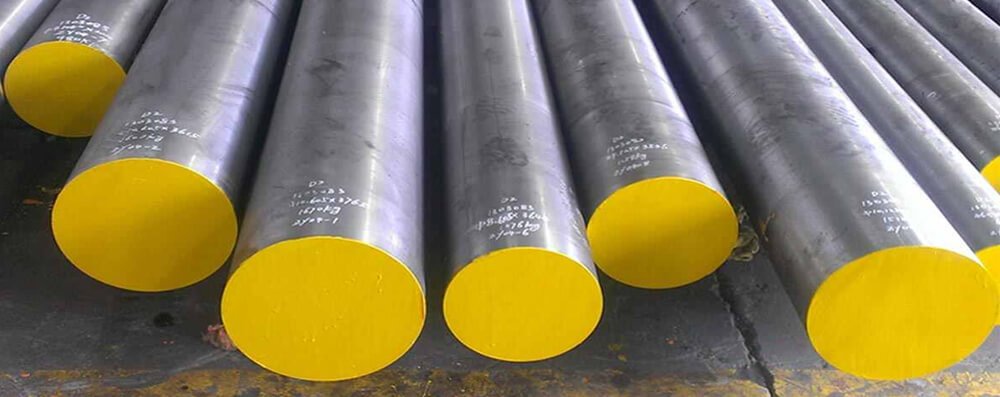Introduction
EN19 is a high-quality, high-strength alloy steel that is widely used in critical applications requiring superior strength, toughness, and wear resistance. It is a chromium-molybdenum steel offering excellent performance and is commonly used in the automotive and engineering sectors. EN19 alloy steel provides good machinability, as well as the capability to respond to heat treatments for a variety of mechanical properties. It is generally used for the manufacturing of gears, shafts, axles, and many other high-performance components.
Properties of the Grade:
- High strength: EN19 has excellent tensile strength and fatigue resistance.
- Good toughness: Offers good impact strength and shock load resistance.
- Wear resistance: Highly resistant to wear and abrasion.
- Good machinability: When annealed, EN19 alloy steel exhibits good machinability.
- Good response to heat treatment: Its hardness and strength can be enhanced through hardening and tempering processes.
- Ductility: The material maintains a good balance between strength and ductility.
- Good weldability: Proper preheating and post-weld heat treatment will allow for reliable welding.
Uses/Applications of the Grade:
EN19 is commonly used in industries where high strength, wear resistance, and fatigue resistance are critical. It is primarily used in the following applications:
- Automotive: Components such as gears, shafts, and crankshafts.
- Engineering: Heavy-duty mechanical parts like axles, spindles, and connecting rods.
- Aerospace: Structural and high-strength components.
- Industrial equipment: Parts requiring high resistance to wear and tear, such as rollers and shafts.
- Oil and Gas: Tooling and equipment exposed to heavy operational loads.
- Marine: Shafts and propellers for marine engineering.
Chemical Composition:
| Element | Content (%) |
| Carbon (C) | 0.36 – 0.44 |
| Manganese (Mn) | 0.60 – 0.90 |
| Chromium (Cr) | 0.80 – 1.10 |
| Molybdenum (Mo) | 0.15 – 0.25 |
| Silicon (Si) | 0.20 – 0.35 |
| Phosphorus (P) | ≤ 0.035 |
| Sulfur (S) | ≤ 0.035 |
Mechanical Properties:
| Property | Value |
| Tensile Strength | 850 – 1000 MPa |
| Yield Strength | ≥ 600 MPa |
| Elongation | ≥ 12% |
| Reduction of Area | ≥ 40% |
| Hardness (Annealed) | 207 – 241 HB |
| Hardness (Hardened) | 50 – 60 HRC |
| Impact Toughness | 27 J (at -20°C) |
Physical Properties:
| Property | Value |
| Density | 7.85 g/cm³ |
| Modulus of Elasticity | 210 GPa |
| Thermal Conductivity | 46.6 W/m·K |
| Specific Heat Capacity | 460 J/kg·K |
| Coefficient of Thermal Expansion | 11.1 × 10⁻⁶ /°C |
Forging:
Forging Temperature Range: 950°C – 1150°C.
Forging Process Recommendations:
- Preheat uniformly to 600°C – 800°C before beginning the forging process.
- Keep the temperature in the recommended range to prevent cracking.
- After forging, allow for proper cooling to avoid stresses.
Heat Treatment:
- Annealing:
- Heat to 850°C – 900°C.
- Cool slowly in a furnace or in air to relieve stresses and reduce hardness.
- Hardening:
- Heat to 830°C – 860°C.
- Quench in oil or water to achieve the desired hardness and tensile properties.
- Tempering:
- Temper at 500°C – 600°C for best balance between strength and toughness.
- Holding time: 1 hour per inch of thickness, followed by cooling in air.
- Stress Relieving:
- Stress-relief treatment can be carried out at temperatures of 600°C – 650°C to avoid distortion or cracking during subsequent machining.
Dimensional Tolerances:
- Standard Tolerances: The alloy generally conforms to ISO and ASTM specifications for bars and rods. Dimensional tolerances typically follow the h9/h11 standard.
- Custom tolerances are available as per customer requirements and machining processes.
Machinability
Machinability in Annealed State: EN19 alloy steel offers good machinability when in an annealed condition.
Recommendations:
- Use carbide or high-speed steel tools for efficient machining.
- Moderate cutting speeds and feeds are recommended to minimize tool wear.
- Proper cooling and lubrication are essential to avoid excessive heating and ensure smooth operations.
Corrosion Resistance:
- Corrosion Resistance: EN19 has moderate resistance to atmospheric corrosion.
- Surface Treatments such as nitriding or chrome plating are often used for applications that require enhanced corrosion resistance.
Machinability:
Weldability: EN19 has good weldability with the correct procedures.
Welding Recommendations:
- Preheat the material to 150°C – 250°C before welding to avoid cracking.
- Post-weld heat treatment (stress relief) is essential to restore mechanical properties.
- Use suitable electrodes for welding, and ensure the steel is free from any contaminants.
Available Form:
EN19 Alloy Steel Bar is available in various forms including:
- Hot Rolled Bars
- Cold Drawn Bars
- Peeled and Ground Bars
- Bright Bars
- Forged Bars
- Turned and Polished Bars
- Cut-to-Length Bars
Conclusion:
EN19 Alloy Steel is a high-performance material widely used in applications that demand superior strength, wear resistance, and toughness. With its excellent response to heat treatment, EN19 is suitable for critical parts such as gears, shafts, and other high-strength components. Its good machinability and weldability further enhance its appeal for diverse industrial applications. By adjusting heat treatment processes, EN19 can provide a perfect balance of hardness, toughness, and strength, ensuring reliability in even the most demanding environments
Related Products : 16MnCr5, EN19, 42CrMo4, 20MnCr5, EN353, EN31, EN24, EN47, EN41B, SAE4140, SAE52100, SAE 8620, SCM420, EN36C, Maps


